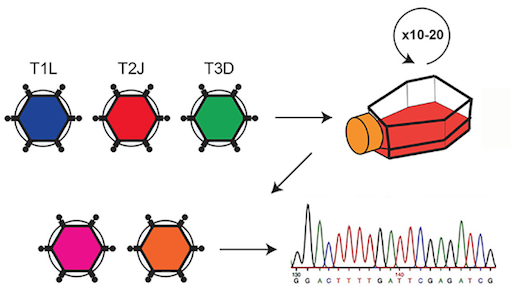A recent paper in Journal of Virology mixes tried-and-true cancer-fighting tactics with the exotic. Sort of a peanut-butter-and-chocolate story, but definitely not tasty!
The tried and true is doxorubicin (Adriamycin), the notorious ‘red devil’ chemotherapy drug, which has been around for decades. On the exotic side, we have oncolytic viruses – viruses retuned to attack cancer cells more than healthy cells. This idea finally made it to FDA approval in 2015 in the form of a re-engineered herpes virus directed against melanoma.
Bernardo Mainou’s lab in the Department of Pediatrics is combining both of these approaches together. He and his team are looking to supercharge reoviruses, a mostly harmless type of virus that has been adapted into an anticancer agent. A Canadian company has brought its reovirus forward into several cancer clinical trials, but its product has not gotten to the finish line.
In the JVI paper, graduate students Roxana Rodriguez-Stewart, Jameson Berry and their colleagues infected triple-negative breast cancer cells with a variety of reoviruses, in an effort to select for those that replicate better in those cells. They also looked for drugs that enhance viral infection of those cells, and landed on doxorubicin and related drugs. Doxorubicin is part of a class of anticancer drugs that inhibit topoisomerases, enzymes that unwind DNA as part of the process of replication.
Yesterday at the GDBBS graduate research symposium, Berry gave a talk about the next step: attaching the souped-up reovirus to doxorubicin.

Three varieties of reovirus were grown together in breast cancer cells to select for efficient replication.




